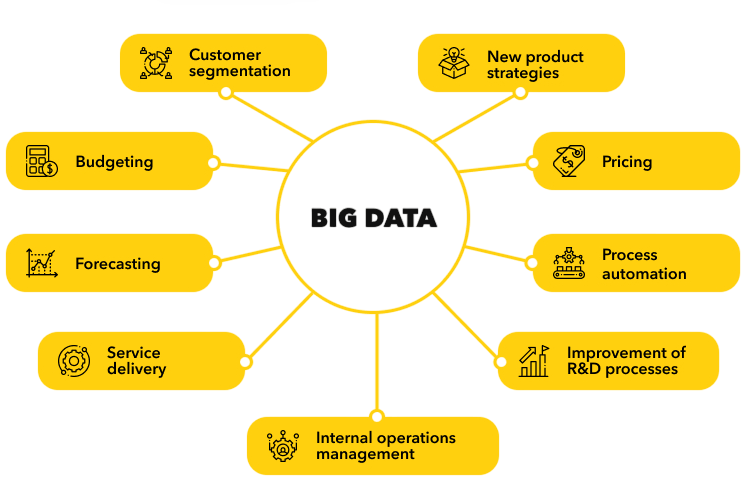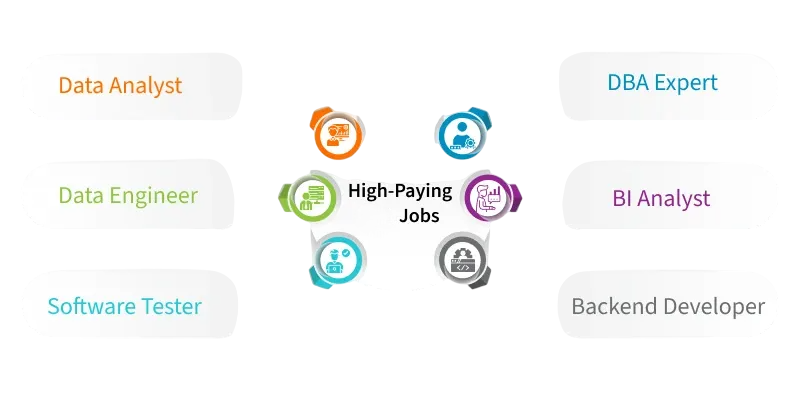
- Introduction Big Data
- Big Data Industry Overview
- Big Data Career Path
- Skills Required by Role
- Learning Roadmap
- Entry-Level to Expert Progression
- Tools and Technologies to Master
- Certifications and Courses
- Specializations and Domains
- Salary Expectations
- Summary
Introduction Big Data
Big Data has become one of the most important forces in the digital economy. With the huge growth of online interactions, connected devices, and business transactions, organizations create vast amounts of information every day. The ability to manage, process, and analyze this data effectively is what makes Big Data such a strong tool. It’s no longer just about handling large datasets, it’s about finding insights that guide smarter decisions, improve efficiency, and create new chances for growth. Data Analytics Training equips professionals with the analytical mindset and technical skills needed to transform raw data into strategic value across industries. A career in Big Data gives professionals the opportunity to work at the forefront of technology and analytics. Roles like Data Engineer, Data Scientist, Big Data Architect, and Business Analyst are essential in this field. Data Engineers build pipelines and infrastructure.
Big Data Industry Overview
Big Data has revolutionized how organizations handle and process information. The increasing reliance on digital platforms, online transactions, IoT devices, and social media has led to an explosion in the volume of data being generated.

This data, when analyzed effectively, provides actionable insights that help companies stay competitive, understand customer behavior, and streamline operations. As a result, Big Data Career Path has found its way into various sectors, including finance, healthcare, education, e-commerce, telecom, and logistics. By 2025, the global Big Data and business analytics market is expected to exceed $275 billion, underlining the strong demand for skilled professionals.
Big Data Career Path
Big Data Career Paths are diverse and offer opportunities for professionals from technical and non-technical backgrounds alike. Some of the most prominent job roles include Data Engineer, Hadoop Developer, and Machine Learning Specialist. How to Become a Big Data Hadoop Architect provides a strategic guide to mastering core technologies, building scalable systems, and positioning yourself for leadership roles in data-driven enterprises.
- Data Analyst: Interprets data and helps businesses make data-driven decisions.
- Big Data Engineer: Develops, tests, and maintains architectures for processing large-scale datasets.
- Data Scientist: Applies statistical techniques and machine learning to solve complex problems.
- BI Analyst (Business Intelligence): Focuses on data interpretation and visualization.
- Data Architect: Designs data management frameworks and ensures system scalability.
- Machine Learning Engineer: Builds algorithms that allow machines to learn from data.
- Data Governance Specialist: Ensures data integrity, privacy, and compliance with regulations.
- ETL Developer: Specializes in Extract, Transform, Load processes.
Each of these roles demands a unique set of skills and offers opportunities for vertical and horizontal growth in the industry.
Interested in Obtaining Your Data Analyst Certificate? View The Data Analytics Online Training Offered By ACTE Right Now!
Skills Required by Role
- Programming: Python, R, Java, and Scala are essential for manipulating data.
- Data Management: Proficiency in SQL, NoSQL databases like Cassandra and MongoDB.
- Frameworks & Tools: Hadoop, Spark, Hive, Pig, HBase for Big Data processing.
- Visualization: Experience in Tableau, Power BI, D3.js, or Google Data Studio.
- Cloud Computing: Familiarity with AWS, Azure, and Google Cloud Platform.
- Statistical Analysis: Understanding of distributions, regressions, hypothesis testing.
- Machine Learning: Using TensorFlow, Keras, PyTorch, and Scikit-learn for model building.
- Soft Skills: Critical thinking, communication, business acumen, problem-solving.
To Explore Data Analyst in Depth, Check Out Our Comprehensive Data Analytics Online Training To Gain Insights From Our Experts!
Learning Roadmap
Becoming a Big Data professional requires a clear path for learning. Start with the basics, such as statistics, linear algebra, and programming fundamentals using Python or R. Next, focus on data manipulation by developing skills in SQL, Excel, and data cleaning methods. Get to know Big Data platforms by studying key parts of the Hadoop ecosystem, including HDFS, MapReduce, Hive, and Spark. Dive into data engineering by learning about data warehousing, building data pipelines, and ETL processes. To stay inspired and informed, Influencers in Big Data & Analytics showcases thought leaders who are shaping the future of data offering insights, frameworks, and innovations that drive industry-wide transformation. Improve your skills with visualization tools like Tableau, Power BI, or Google Looker. To complete your education, study machine learning, including both supervised and unsupervised algorithms, along with ways to evaluate models. Also, understanding cloud platforms like AWS and Azure is important for grasping how data is stored, processed, and used. Finally, put your new skills to work with capstone projects that use real-life datasets. This learning journey will prepare you for a successful career in Big Data.
Entry-Level to Expert Progression
The career path in Big Data is straightforward and offers clear opportunities for growth at each level. For newcomers, entry-level roles like Junior Data Analyst, ETL Developer, and Data Steward are common. As you gain experience, usually after two to five years, you can move up to mid-level positions such as Big Data Developer, BI Analyst, or Data Scientist. After five to ten years in the field, you can shift into senior roles like Data Architect or Lead Data Engineer. Data Analytics Training lays the foundation for this career progression building the technical and analytical skills needed to advance from entry-level roles to leadership positions in data-driven organizations. For those with more than ten years of experience, top-level positions like Chief Data Officer (CDO) or Director of Analytics become available. Each of these stages not only increases your responsibilities but also lets you lead teams, manage projects, and make important decisions that can shape the organization’s future. This clear path makes a career in Big Data both rewarding and exciting.
Gain Your Master’s Certification in Data Analyst Training by Enrolling in Our Data Analyst Master Program Training Course Now!
Tools and Technologies to Master
Mastering a wide range of tools is critical for success: from Hadoop and Spark to Kafka, Hive, and Airflow, each plays a role in building scalable data pipelines. Big Data Engineer Salary reflects how proficiency across this ecosystem directly influences compensation highlighting the value of hands-on expertise in today’s data-driven job market.
- Hadoop Ecosystem: HDFS, YARN, Hive, Pig, MapReduce.
- Apache Spark: For fast, in-memory data processing.
- Databases: Cassandra, MongoDB, PostgreSQL, Oracle.
- ETL Tools: Apache NiFi, Talend, Informatica.
- Cloud Tools: AWS Glue, Azure Synapse, Google BigQuery.
- Visualization: Power BI, Tableau, QlikView.
- Programming Languages: Python (Pandas, NumPy), Scala, SQL.
- Containerization: Docker, Kubernetes for scalable deployment.
Are You Preparing for Data Analyst Jobs? Check Out ACTE’s Data Analyst Interview Questions and Answers to Boost Your Preparation!
Certifications and Courses
Certifications help validate expertise and increase job prospects:
- Cloudera Certified Data Engineer/Analyst
- Google Cloud Professional Data Engineer
- AWS Certified Data Analytics Specialty
- IBM Data Science Professional Certificate
- Microsoft Azure Data Scientist Associate
Courses from Coursera, edX, Udacity, DataCamp, and Simplilearn offer comprehensive Big Data curricula with hands-on labs.
Specializations and Domains
Professionals can specialize in different industries, each with its own analytics focus. In healthcare analytics, experts look at electronic health records and predict diseases to improve patient outcomes. Retail analytics centers on customer segmentation and optimizing inventory to meet consumer demands. In finance, analysts work on risk modeling and real-time fraud detection to protect assets.

To support these data-intensive use cases, What is Hive explains how Hive simplifies querying large datasets with SQL-like syntax making it easier for analysts and engineers to extract insights from Hadoop-based systems. Meanwhile, manufacturing professionals use predictive maintenance and defect detection to improve production efficiency. Transportation analytics focuses on optimizing routes and analyzing fuel consumption to cut costs and enhance service. Telecom analytics deals with predicting customer churn and assessing network performance to keep customers. Finally, social media analytics aids brands in finding influencers and measuring content performance to boost engagement. Each area presents unique challenges and benefits, making analytics a key field across industries.
Salary Expectations
Big Data professionals earn competitive salaries worldwide. Here’s an estimate: compensation often correlates with mastery of core frameworks. What Is MapReduce explains the foundational paradigm behind distributed data processing highlighting how mapping and reducing operations enable scalable analytics across massive datasets.
India:
- Entry-Level Data Analyst: ₹5–8 LPA
- Mid-Level Data Engineer: ₹10–18 LPA
- Senior Data Scientist: ₹20–35 LPA
- Data Architect/Manager: ₹25–45 LPA
United States:
- Data Analyst: $65,000–$90,000
- Data Scientist: $95,000–$140,000
- Big Data Engineer: $100,000–$150,000
- Chief Data Officer: $180,000–$250,000
Startups and global firms offer ESOPs, bonuses, hybrid work, and other perks.
Summary
The Big Data career path offers endless possibilities for those passionate about data and its transformative power. With roles ranging from analysts to architects and scientists, the domain is diverse, dynamic, and financially rewarding. As organizations continue to digitize and rely on data to stay competitive, the demand for Big Data professionals will only grow. Data Analytics Training serves as a launchpad for aspiring experts offering the technical depth and industry relevance needed to thrive in this fast-evolving landscape. Continuous learning, practical experience, and industry-recognized certifications are key to thriving in this space. Whether you’re starting your career or transitioning from another domain, Big Data offers a future-proof opportunity in the modern tech world.


